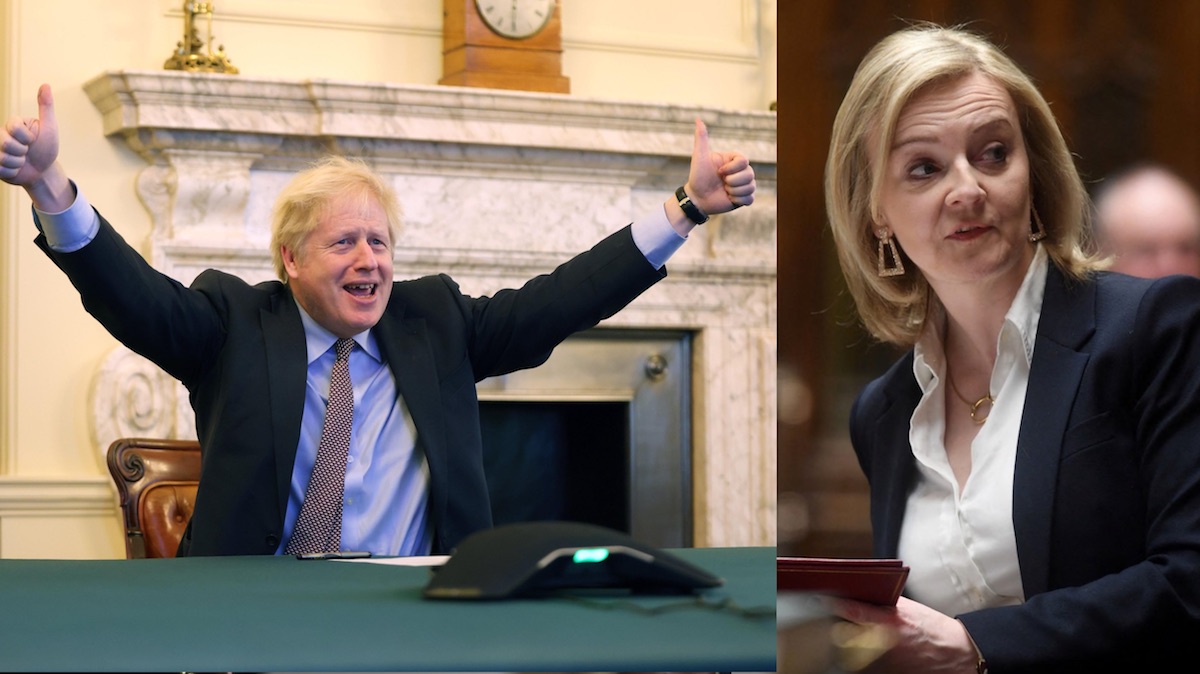
The British government has initiated the process of formally reneging on the Brexit Withdrawal Agreement with the introduction of unilateral legislation to “disapply” parts of the protocol on trade in the north of Ireland.
The move upends several years of delicate international diplomacy and is likely to trigger international legal actions, sanctions and a trade war against the British government.
At Westminster this afternoon, Britain’s Foreign Affairs Minister Liz Truss (pictured, right) confirmed the plan to rip up the deal to take Britain out of the EU, signed by Boris Johnson amid considerable fanfare in December 2020 (left).
Informing Westminster of the decision to override the Brexit accords on the north of Ireland, she said the Belfast Executive has not been functioning because the protocol does not have the support of unionists.
It follows the decision of the hardline unionist DUP to block the return of the Stormont Assembly and Executive after Sinn Féin won the Six County elections earlier this month. A clear majority of Assembly members returned in the election support the retention of the Protocol as negotiated.
It also follows a high-profile visit to Belfast by Johnson on Monday in which he sought to justify the huge u-turn and its dangerous one-way concession to unionists.
Johnson’s unilateral action to welch on the Brexit deal has renewed the threat of a remilitarised border through Ireland, a long-standing goal of the DUP and right-wing Tories who have backed Brexit as a means of reinforcing the partition of the island.
The British government has ironically claimed the move is an attempt to uphold the 1998 Good Friday peace deal.
“The peace process and acting in the interests of Northern Ireland is what motivates her,” British officials said, in advance of Truss’s announcement.
Delivering her statement to MPs at Westminster, Truss doubled down on the claim that the decision to renege on Brexit is in support of the Good Friday Agreement.
She says that the Protocol “does not have the support necessary in one community [unionism]” and there is a need to find a ‘balance’.
Sinn Féin leader Mary Lou McDonald said that by supporting the DUP, the British government was helping to block the operation of the Six County institutions. She also hit out at Johnson’s claims to be seeking to “fix” the Protocol.
“It’s become increasingly clear that Boris Johnsons actions are all part of a choreographed and disgraceful set of events designed to give cover to the DUP,” she said.
“That is not acceptable. Nobody has a veto on progress and the blocking of the Executive shouldn’t be tolerated for even one day longer.”
She said “the man who negotiated the Protocol” was introducing the legislation “to break the law and create further instability and undermine the Good Friday Agreement.
“The outcome of this month’s election must be respected, and we need to get the Executive formed without any further delay.”
At Westminster, Truss said London will “remain open” to further talks while it introduces legislation in the coming weeks to make changes to the protocol.
And despite reportedly dire exchanges in recent days between Truss and the EU’s Brexit negotiator, Maros Sefcovic, she invited him to London to discuss the situation “as soon as possible”.
Meanwhile, there have been high-level meetings on the move in Washington and New York involving representatives of the Biden Administration, the US State Department, and Ireland’s Permanent Mission to the UN.
“The support for the Good Friday Agreement (GFA) in the US cuts across party lines, and there is zero tolerance for the antics of the British government,” said Sinn Féin’s Foreign Affairs spokesperson, John Brady TD, who was taking part in the meetings.
“The Biden administration has been very strong in their support for the GFA.”
![[Irish Republican News]](https://republican-news.org/graphics/title_gifs/rn.gif)
![[Irish Republican News]](https://republican-news.org/graphics/title_gifs/harp.gif)

